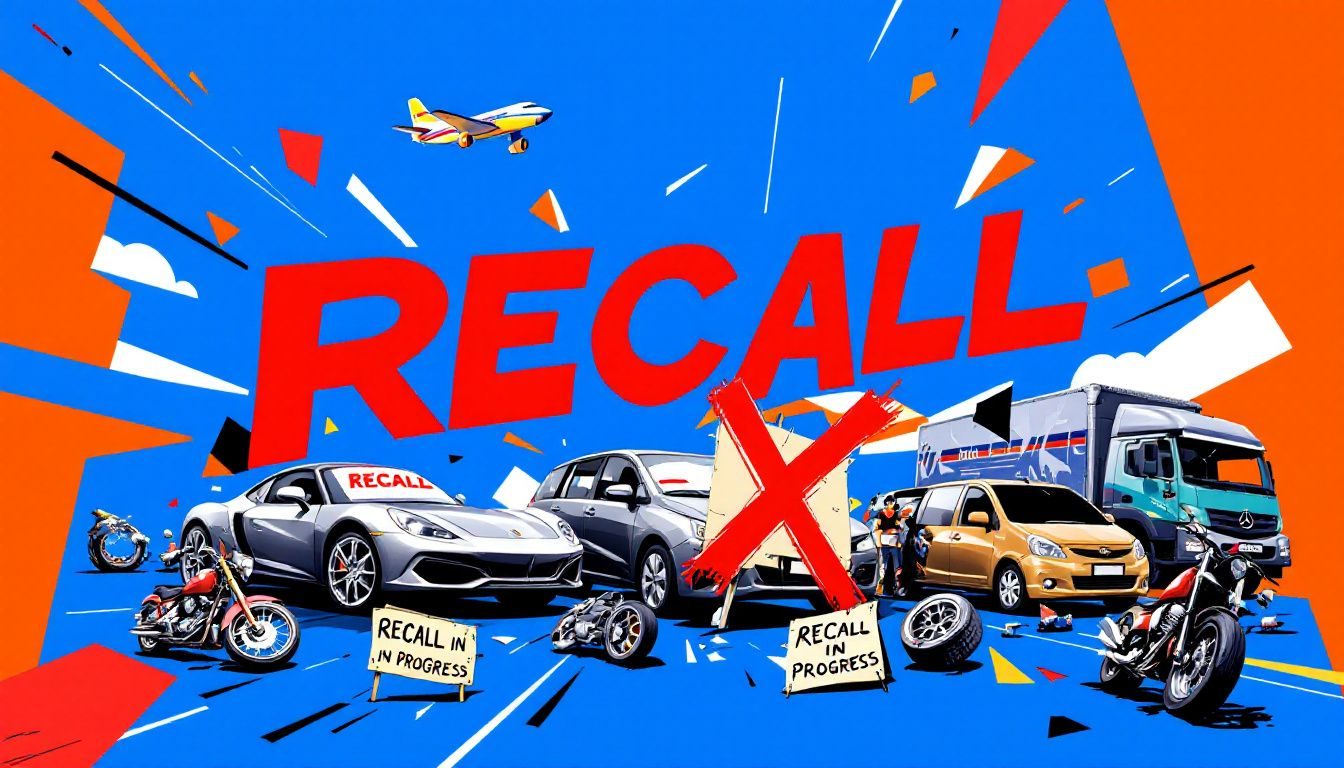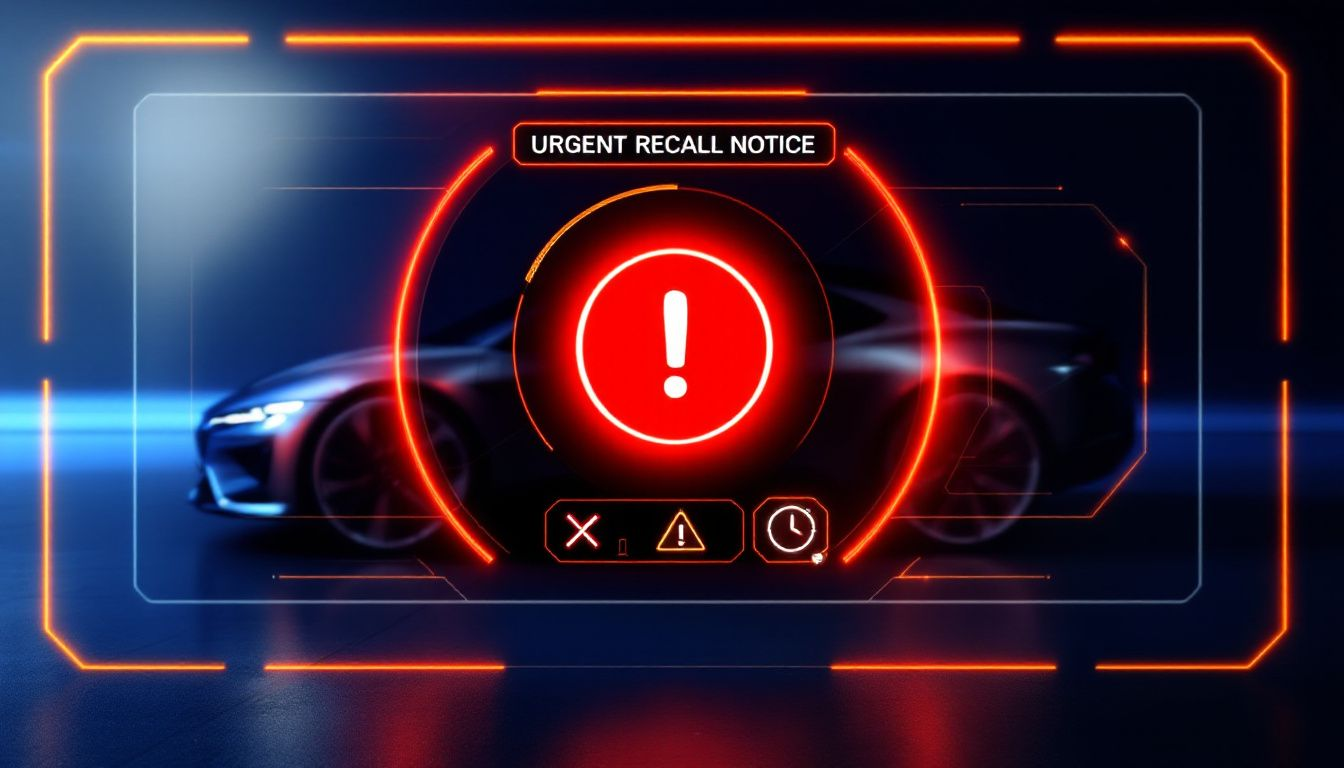Top Tips for Checking Vehicle Recall Status by VIN
Do you need to check if your car has a safety recall? Use your VIN to find out quickly. This article walks you through the steps to check your vehicle recall status, understand safety defects, and what actions to take if your car is affected.
Key Takeaways
- Vehicle recalls are essential for addressing safety hazards and protecting the public, with manufacturers required to provide accurate recall information.
- The NHTSA oversees the recall process, ensuring that manufacturers notify vehicle owners promptly and effectively manage recall campaigns for safety defects.
- Vehicle recalls do not expire, and manufacturers are responsible for repairing safety defects indefinitely, highlighting the importance of regular recall checks for vehicle owners.
Understanding Vehicle Recalls

When a motor vehicle or its components pose a safety risk, a recall is enacted to remedy the potential threat to drivers, passengers, and others on the road. These recalls are essential for rectifying possible dangers and preserving public well-being. The Takata airbag recall stands out as one of the largest and most persistent in car industry history.
Manufacturers must issue recalls if they determine that their vehicles present an undue hazard regarding safety or fail to meet established minimum safety standards. It’s mandatory for manufacturers to disclose detailed information about these safety recalls so that owners understand both what defects are involved and how they impact vehicle security.
It’s important to note that vehicle safety recalls encompass not just automobiles but also include child car seats, and tires, among other related equipment. To address such concerns comprehensively across various types of motor gear, tools like those provided by NHTSA allow users to conduct thorough checks ensuring broad-spectrum vehicular protection.
The process surrounding these crucial automotive callbacks serves as an invaluable tool in reducing risks tied to manufacturing errors or problems linked directly with motor vehicle security measures. Notably prevalent among older models of cars requiring steady awareness and routine upkeep—addressing any open recall notices can notably lower incidents leading up to accidents thus safeguarding those who own such vehicles. For accurate license plate information and updates related to vehicle ownership, contacting state departments of motor vehicles is essential. Additionally, using the VIN is crucial for searching recalls associated with motor vehicles.
The Importance of Checking Recall Status
Checking the recall status of your vehicle is crucial for ensuring your safety on the road. Vehicle safety recalls are issued by manufacturers when a safety-related defect or non-compliance with federal motor vehicle safety standards is identified. These recalls can affect various aspects of your vehicle, including motor vehicle equipment, and can pose a significant risk to you and your passengers.
As a vehicle owner, it is your responsibility to stay informed about any open safety recalls that may affect your vehicle. Ignoring recall notices can lead to serious consequences, including accidents, injuries, and even fatalities. By checking your vehicle’s recall status, you can ensure that any necessary repairs are made, and your vehicle is safe to operate.
Identifying Safety Defects
Defects in vehicle safety can greatly undermine both the performance and dependability of a vehicle, thereby increasing the likelihood of accidents. These defects could be minor, such as tires that have deteriorated over time, or major mechanical flaws including failure within the braking system. The recognition of these issues marks an essential step towards preserving overall vehicular safety.
Issues often found include problems with steering parts which might fracture, leading to lost control during driving—such risks are especially severe since they directly affect how safely a driver can operate their vehicle. Vehicles that have been on the road longer typically display more frequent deficiencies, increasing their chances of being involved in traffic incidents.
The rate at which safety recalls for vehicles are issued varies according to several factors like car model and manufacturer as well as its production year and design. Keeping abreast with information about possible malfunctions and acting swiftly when it comes to repairs is crucial for significantly bolstering both reliability and safety standards for any given vehicle.
The Role of the National Highway Traffic Safety Administration (NHTSA)
The oversight of safety recalls for vehicles with defects is a significant responsibility of the National Highway Traffic Safety Administration (NHTSA), which safeguards vehicle safety. Should there be a series of complaints regarding any vehicular product, an investigation can be launched by the NHTSA to ascertain whether there’s indeed a threat to safety. By doing so, this helps in preempting hazards and preventing accidents from occurring.
Ensuring that manufacturers fulfill their obligations effectively during recall episodes is also part of NHTSA’s duties, protecting owners’ rights to secure and efficient remedies. The agency does this by monitoring manufacturer-led recall initiatives and scrutinizing the precision of information disseminated on both defects at hand and repairs required. This regulatory function was underscored when over 34 million vehicles were subject to recalls within U.S. borders in 2023 alone—a stark reminder that vigilance in vehicle security measures remains essential.
It’s incumbent upon manufacturers to immediately inform the NHTSA of detected vehicle faults that pose risks related to safety. Through meticulous supervision by the administration, these necessary recall processes are conducted efficiently—upholding not just owner welfare but broader public well-being against potential dangers associated with such vehicle flaws.
Notification Process for Vehicle Owners

Owners of vehicles are required to be informed by manufacturers about a recall within two months after notifying the National Highway Traffic Safety Administration (NHTSA) about any issues concerning vehicle safety. This procedure is designed so that owners of affected vehicles become cognizant of potential dangers, enabling them to respond appropriately and swiftly in order to diminish risks.
Upon initiating a recall, manufacturers will reach out directly to all registered vehicle owners through mailing letters that explain what the defect entails, outline its associated hazards, and provide guidance on how repairs should proceed. These communications assure recipients that they would not incur costs for repair services related to the recall. It’s important for those who receive such correspondence regarding their vehicle’s recalls to keep detailed records of both remedial actions taken and any interaction with officials pertaining to these matters.
Should you be an owner receiving notice about your vehicle being recalled, it is imperative that you quickly get in touch with a certified dealer who can perform the necessary corrective measures. Ensuring expediency when dealing with defects reinforces overall automobile safety standards significantly—this holds true even if considerable time has lapsed since initial announcements were made about recalls affecting your car or truck. Immediate attention to rectifying recalled vehicular components remains crucial in preserving safe driving conditions.
How to Check if Your Car Is Under Recall

It’s advisable to conduct safety recall checks on your motor vehicle biannually, which helps maintain awareness of any potential safety hazards. This practice keeps you informed of emerging safety concerns that could affect your vehicle. You can determine whether there is an active recall on your vehicle by inputting the VIN or license plate number at NHTSA.gov/recalls.
Locally located. In two places—either etched into the bottom left side of your windshield or inside the driver’s door jamb—the Vehicle Identification Number (VIN) consists of 17 characters unique to each motor vehicle. A search result indicating ‘0 unrepaired recalls associated with this VIN’ means that there are no pending repairs under a recall for that particular car. Note: Such a search won’t include already repaired safety issues, some freshly publicized recalls, ones exceeding 15 years old, and those from minor manufacturers. Thus, utilizing a VIN lookup tool might be necessary for comprehensive information.
Should discrepancies arise between results from a license plate inquiry and actual ownership possibly leading to incorrect data regarding open recalls—a scenario typically caused by out-of-date state department records—it is crucial to keep registration details current so as not only to ensure precise notifications but also safeguard against preventable risks associated with unattended manufacturer defects.
Using Online Tools to Check Recall Status
Fortunately, checking your vehicle’s recall status has never been easier. The National Highway Traffic Safety Administration (NHTSA) provides a VIN lookup tool that allows you to search for open recalls by entering your vehicle’s identification number. This tool is a valuable resource for vehicle owners, as it provides recall information on vehicles from major manufacturers, including Western Star, Yamaha motorcycles, and small vehicle manufacturers like Saab, Saturn, and Scion.
To use the VIN lookup tool, simply enter your vehicle’s 17-digit VIN, and the tool will provide information on any open recalls. You can also use your license plate number or vehicle’s registration to search for recalls. Additionally, many manufacturers, like FCA US LLC, offer online tools that allow you to check your vehicle’s recall status and schedule appointments for free repairs.
Common Safety-Related Defects
Approximately 42% of crashes related to vehicle defects can be traced back to faulty brakes, underscoring their vital importance in the realm of vehicle safety. The presence of brake-related issues can exacerbate the severity and outcome of a crash. Ensuring regular maintenance and adhering to recall repair requirements are essential steps in averting accidents attributable to such flaws.
Tire malfunctions, specifically blowouts, are implicated in about 22,4% of vehicular incidents attributed to component failures, emphasizing the necessity for vigilant tire upkeep. Vulnerability to abrupt tire failure can lead to serious mishaps at elevated velocities. Hence maintaining tires properly and heeding recalls proactively is crucial for risk reduction.
The malfunction or inadvertent deployment of airbags poses a heightened injury hazard during traffic collisions. Notably, absent airbags factor into approximately 70% of these events, which suggests an alarming correlation between failed safety mechanisms and automotive imperfections—this extends notably also towards child restraint systems where compromised elements like defective buckles place young occupants at escalated peril amidst impacts.
Fuel system anomalies have been known causative agents behind catastrophic occurrences including ignitions or blasts, particularly within collision scenarios. Additional prevalent issues affecting automobile security entail errant windshield wipers impairing visibility under challenging meteorological conditions as well as flawed seating structures that might fail to provide requisite support when accidents occur.
Non-Safety Related Defects
Defects that do not pose a risk of injury or accidents, such as air conditioning failures, are classified as non-safety-related and do not result in the recall of the vehicle. While they can cause inconvenience for drivers or passengers, these defects don’t threaten the essential safety functions of a car. This category includes issues with aesthetic aspects like paint imperfections alongside other examples.
Problems associated with passenger comfort — including faulty seat heaters or audio systems — typically fall outside the scope of safety concerns within a vehicle’s operation. Defects involving amenities like air conditioners are usually not categorized under safety-related defects and hence seldom prompt recalls since they lead more often to dissatisfaction rather than direct risks to occupants’ well-being.
While non-safety-related defects may escape recall actions due to their lack of impact on immediate vehicular safety, warranties commonly address them allowing owners to resolve these faults effectively. Promptly correcting such shortcomings contributes positively toward improving users’ driving experiences without affecting overall vehicle security.
Manufacturer Responsibilities in Safety Recalls

Manufacturers have the duty to initiate recall campaigns to address safety defects by repairing, replacing, or refunding the affected vehicles. They are required by law to keep track of how well their recalls are performing and make certain that any repaired vehicles remain safe. The goal is for these manufacturers to resolve safety concerns thoroughly so they do not present future risks.
The financial burden of fixing defects tied to safety recalls falls on the manufacturers. Within a two-month period from when a recall decision is made, vehicle owners must be informed by these manufacturers. It’s imperative for vehicle owners to receive this information swiftly in order for them to take necessary actions regarding their own safety in due time.
Unless non-safety-related defects significantly compromise how reliably a vehicle functions, typically manufacturers aren’t held accountable for them. It is incumbent upon them to promptly and effectively rectify all issues pertaining directly to the vehicle’s safety features.
Do Car Recalls Expire?
Manufacturers are perpetually obligated to repair safety defects in vehicles due to the indefinite nature of open recalls. No matter how old the vehicle is, manufacturers may be required to correct safety issues, although they might impose fees depending on the age of the vehicle.
Responsibility for addressing open recalls persists regardless of whether a vehicle’s warranty has lapsed. Numerous vehicles still have unresolved recalls which present hazards if repairs aren’t made. It’s crucial for drivers to continually monitor their vehicles for any outstanding recalls and ensure that all necessary corrections are carried out promptly.
Taking Action After a Recall-Related Injury
When a vehicle owner is involved in an accident with a vehicle that has been recalled, it’s imperative to receive immediate medical care to document any injuries for subsequent insurance or legal proceedings. It can be particularly complex when the accident involves a recalled vehicle as establishing negligence may be required for compensation claims. Preserving the original condition of the vehicle following an incident is essential since it could serve as critical evidence of existing defects.
In scenarios where accidents are caused by vehicles under recall, victims may have grounds to seek recompense from the manufacturers provided they can prove negligence on the part of said manufacturers. Victims are advised to retain the services of an adept auto accident lawyer who is versed in managing claims associated with such recalled vehicles. In instances where expenses have arisen due to repairs stemming from recalls, owners might qualify for financial restitution directly from the manufacturer.
For those suffering injuries owing to incidents linked with automobile recalls, contacting 1-800-THE-LAW2 means that you can potentially access a free consultation session with an attorney in our network experienced in handling vehicular accidents.
Staying Informed About Recalls
Staying informed about recalls is an ongoing process that requires your attention. Here are some tips to help you stay up-to-date:
- Regularly check your vehicle’s recall status using the NHTSA’s VIN lookup tool or your manufacturer’s online tool.
- Sign up for recall alerts from your manufacturer or the NHTSA to receive notifications about recently announced safety recalls.
- Keep your vehicle’s registration and contact information up-to-date to ensure you receive recall notices.
- Be aware of any unusual issues or problems with your vehicle, as these could be related to a safety recall.
By following these tips and staying informed about recalls, you can ensure your vehicle is safe to operate and protect yourself and your passengers from potential harm.
Summary
Vehicle safety recalls play an essential part in preserving road security. Recognizing the nature of safety recalls, pinpointing potential defects that compromise safety, and being adept at checking for recall notifications can greatly minimize the dangers stemming from faulty vehicle components. The pivotal functions played by both NHTSA and car manufacturers in initiating and executing these recalls are fundamental to swiftly remedying such issues.
It’s important for vehicle owners to regularly utilize the VIN lookup tool to stay abreast of new recall alerts and react without delay upon receiving notice of a recall. Awareness of their entitlements is also crucial, especially if they need to pursue compensation following an incident related to a recalled component.
Ensuring you’re well-informed and active regarding your vehicle’s recalls contributes markedly toward keeping it reliable as a safe means of transportation. By maintaining vigilance over vehicle safety notices through prompt action on detected flaws, you safeguard not only yourself but others too against preventable mishaps linked with automotive defects.
Frequently Asked Questions
What is a vehicle identification number?
A VIN, or Vehicle Identification Number, is a unique 17-character code assigned to each vehicle for identification purposes and to track its history.
It is essential to understand a vehicle’s background and ownership.
Where can you find your vehicle’s VIN?
Your vehicle’s VIN can be located on the lower left of the windshield, inside the driver-side doorjamb, or on your car’s registration and insurance cards.
These positions ensure easy access for identification purposes.
How often should I check for open recalls?
You should check for vehicle recalls at least twice a year to stay informed about any potential safety issues affecting your vehicle.
Regularly monitoring this information is vital for your safety.
What should I do if my car is under recall?
If your car is under recall, it is essential to contact an authorized dealership immediately to schedule the required repairs.
Ensure you maintain detailed records of all communications and repairs related to the recall.
Do car recalls expire?
Vehicle safety recalls are perpetual and manufacturers must remedy defects that compromise safety throughout the vehicle’s lifetime, regardless of whether the warranty is still valid.
As a result, it is imperative to periodically verify if there are any unresolved recalls for your vehicle.




